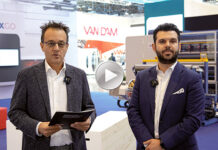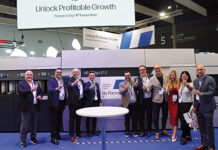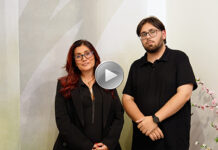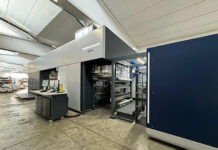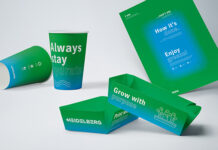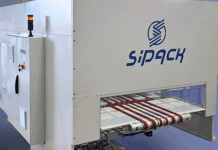From 19 to 26 October 2022 around 3,000 companies from 61 nations will present their latest innovations for the efficient and responsible use of plastics trying to mark a path to follow for the plastics and rubber industry after the changes caused by the pandemic: 18 halls where we will see machines and equipment; raw materials, auxiliary materials and semi-finished products, technical parts and products in reinforced plastic
Recycling and sustainability will be the central themes on which K 2022 will propose a series of events and insights, with a global vision ensured by the internationality of the exhibiting companies representing all segments of the plastic sector, where flexible packaging will play a central role.
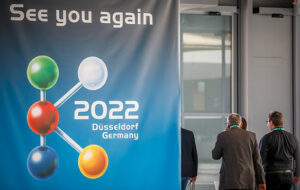 At the last K three years ago, exhibitors unanimously stressed the need for functioning and closed cycles along the entire recycling chain. K 2022 will demonstrate how the industry is taking responsibility but above all that plastics will not be the problem of the future, but rather part of the solution, consequently the key themes of the fair will be circular economy, climate protection and digitization that will also have a lot of space in the special initiatives of K 2022. The official special exhibition of K in Düsseldorf “Plastics Shape The Future” will take place in hall 6 and the message “The industry is undergoing a fundamental transformation towards a circular economy” will be recalled in dedicated days, round tables and Infotainment to underline the increasingly close relationship between plastic and sustainability. The Circular Economy Forum will be also re-proposed, which has already had a successful preview at last K: here 13 companies associated with VDMA (German Association of Mechanical and Plant Engineering) will make the circular economy tangible and present the topic in its wholeness.
At the last K three years ago, exhibitors unanimously stressed the need for functioning and closed cycles along the entire recycling chain. K 2022 will demonstrate how the industry is taking responsibility but above all that plastics will not be the problem of the future, but rather part of the solution, consequently the key themes of the fair will be circular economy, climate protection and digitization that will also have a lot of space in the special initiatives of K 2022. The official special exhibition of K in Düsseldorf “Plastics Shape The Future” will take place in hall 6 and the message “The industry is undergoing a fundamental transformation towards a circular economy” will be recalled in dedicated days, round tables and Infotainment to underline the increasingly close relationship between plastic and sustainability. The Circular Economy Forum will be also re-proposed, which has already had a successful preview at last K: here 13 companies associated with VDMA (German Association of Mechanical and Plant Engineering) will make the circular economy tangible and present the topic in its wholeness.
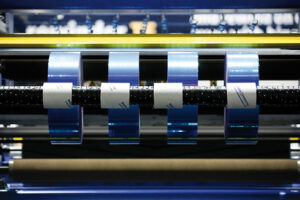 Science Campus K 2022 will emphasize the importance of the dialogue between research and companies. Here exhibitors and visitors will have the opportunity to have a concentrated overview of scientific activities and results in the plastics and rubber sector and to exchange experiences between different universities and companies.
Science Campus K 2022 will emphasize the importance of the dialogue between research and companies. Here exhibitors and visitors will have the opportunity to have a concentrated overview of scientific activities and results in the plastics and rubber sector and to exchange experiences between different universities and companies.
In order to attract young people to the plastics industry, which has enormous recruiting problems, and to ensure in the future a sufficient number of young talents, in 2010 GKV (General Association of the Plastics Processing Industry), with the motto “kai – be there!” launched the Plastics Training Initiative (kai) together with other associations and institutions and Messe Düsseldorf.
The Start-UP Area makes its debut at K 2022, offering newcomers who have dedicated themselves to the development of innovative products and solutions in the field of plastics and rubber, a dedicated area to introduce themselves.
The plastics industry is the seventh largest economic sector in Europe
 In individual application markets, the polymer value chain remains relatively stable overall, even in times of crisis. The plastics industry (manufacturing and processing) in the EU27 achieved a turnover of over € 328 billion in 2020 with 1.47 million employees in almost 51,700 companies, mostly small and medium-sized. This was established by the association of producers of Plastics Europe according to Eurostat information. According to Plastics Europe, the packaging industry in Europe required the largest share of plastics with 40.5%.
In individual application markets, the polymer value chain remains relatively stable overall, even in times of crisis. The plastics industry (manufacturing and processing) in the EU27 achieved a turnover of over € 328 billion in 2020 with 1.47 million employees in almost 51,700 companies, mostly small and medium-sized. This was established by the association of producers of Plastics Europe according to Eurostat information. According to Plastics Europe, the packaging industry in Europe required the largest share of plastics with 40.5%.
The focus of production has changed significantly and after steady growth over the past 20 years it has clearly moved to Asia. Today, more than 50% of the world’s plastic is produced here. China alone, by far the leading country, increased its share last year to 32%, respectively to more than 110 million tons. The market share of Europe, on the other hand, decreased again slightly from 17.2% in 2018 and from 15.7% in 2019 to only around 15% or just over 55 million tons (2019: 57.9 million of tons, 2018: 61.8 million tons).
The great challenges must be overcome
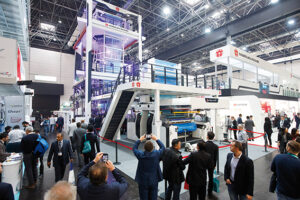 We can hope that the pandemic will finally end in 2022. The global problems in the procurement of raw materials, supply chains and logistics will certainly be solved step by step, thanks to market laws.
We can hope that the pandemic will finally end in 2022. The global problems in the procurement of raw materials, supply chains and logistics will certainly be solved step by step, thanks to market laws.
The circular economy was rightly the central motto of the last edition of the fair in 2019. As a result of legal requirements and various efforts and initiatives, the recycling rate in Europe (former EU28 plus Switzerland and Norway) has continued to grow steadily. The most important recycling routes in 2018 were energy consumption at 42% and mechanical recycling at 33%, while around 25% of plastic waste ended up in landfills. Ten years earlier (2008), 30% had been thermally recovered, 21% recycled and 49% landfilled.
When it comes to packaging recovery (energy recovery and recycling), all European countries are now reaching rates of over 30%, 17 countries at least 70%, ten over 98% and some even 100%. In 2018, more plastic packaging (42.4%) was mechanically recycled than energetically recovered packaging (38.5%) and only 19.1% ended up in landfills.
The topic is therefore the subject of intense work, but the implementation in extensive reuse is still in its infancy. K 2022 will show the progress made so far and at the same time initiate the necessary course-setting for the coming years and decades. Because many solutions have been formulated and pondered, but now decisions must be made. One thing is clear: without plastic, a future for humanity with today’s numbers and form is absolutely unimaginable.





